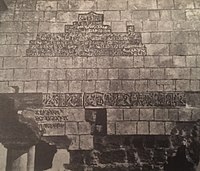Menucihr Mosque
Style
The style of the vault is considered as similar to that of the gavit or zhamatun of the Church of the Holy Apostles at Ani (built before 1217), suggesting broadly similar dates and circumstances.
Inscriptions
A kufic inscription in a long band on its left façade related to the foundation of the mosque by Manuchihr ibn Shavur, under the government of Seljuk Sultan Malik-Shah I:
[In the name of Allah, most gracious, most merciful, the construction of this mosque and mi]naret was ordered by the great emir Shuja al-daula Abu Shujā Mīnuchīhr b. Shavūr in the government of our lord, the exalted sultan, the great Shahanshah [the great king of all peoples, ruler of the Arabs and Persians, king of the Ea]st and West, Abu-l Fath Malikshah b. Alp-Arslan…
— Foundation inscription of the mosque.
A small trilingual inscription in the bottom left corner reads:
In Persian (no longer visible): In hejira 635 [1237/1238], the sinner, Zikéria, son of the late...
In Georgian [upper two lines]: In koronikon 458 [1238] I, the atabeg Zakaria, I have confirmed this
In Armenian [lowest line]: Those who observe this, may they be blessed by God
— Trilingual inscripition
On top of it are a large Mongol Ilkhanid yarligh inscription of 1319, a taxation edict.
-
Menucihr Mosque, plan, 1881.
-
Menucihr Mosque, outside, 1881.
-
Menucihr Mosque, plan, 1881.
-
Trilingual inscription
-
Column top with muqarnas design
-
Ceiling with muqarnas design, 1072-1086
-
Ceiling decoration
-
Ceiling decoration
See also
References
- ^ Ani Cultural Landscape (PDF). Unesco. p. 31.
Researchers has dated the structure to the year of 1086
- ^ "SHADDADIDS – Encyclopaedia Iranica". iranicaonline.org. Retrieved 2020-12-13.
- ^ "MENÛÇİHR CAMİİ". TDV Encyclopedia of Islam (44+2 vols.) (in Turkish). Istanbul: Turkiye Diyanet Foundation, Centre for Islamic Studies. 1988–2016.
- ^ "Anatolia's 1st Turkish mosque to open to worship after restoration". The Frontier Post. 2020-06-25. Retrieved 2021-06-02.
- ^ Kalas, Veronica (2008). "The Georgian Aspects of Medieval Architecture at Ani in the Thirteenth Century: The Church of Tigran Honents and the Mosque of Minuchir". In Tumanishvili, D. (ed.). Georgian Arts in the Context of European and Asian Cultures. Tbilissi: Georgia Arts and Cultural Center. pp. 211–216.
- ^ Eastmond, Antony (1 January 2017). Tamta's World: The Life and Encounters of a Medieval Noblewoman from the Middle East to Mongolia. Cambridge University Press. p. 130, note 15. doi:10.1017/9781316711774.007.
This date is based on the similarity between its stone vaults and those of the zhamatun of the church of the Holy Apostles, which has a terminus ante quem of 1217, determined by the earliest surviving inscription there: Orbeli, Corpus Inscriptionum Armenicarum, no. 56; Basmadjian, Inscriptions armeniennes d'Ani, no. 49.
- ^ Eastmond, Antony (1 January 2014). "Inscriptions and Authority in Ani". Der Doppeladler. Byznanz und die Seldschuken in Anatolien vom späten 11. bis zum 13. Jahrhundert, eds. Neslihan Austay-Effenberger, Falko Daim: 75-76, Fig.5.
- ^ Eastmond, Antony (1 January 2014). "Inscriptions and Authority in Ani". Der Doppeladler. Byznanz und die Seldschuken in Anatolien vom späten 11. bis zum 13. Jahrhundert, eds. Neslihan Austay-Effenberger, Falko Daim: 79.
- ^ Allishar (1881). Shirak. Teghagrut'iwn patkerats'oyts' [Illustrated Topographical Study of Shirak].
- ^ "Armenian Architecture - VirtualANI - The Mosque of Minuchihr". virtualani.org.
![Menucihr Mosque, plan, 1881.[9]](http://upload.wikimedia.org/wikipedia/commons/thumb/3/3f/Menucihr_Mosque%2C_inside%2C_1881.jpg/200px-Menucihr_Mosque%2C_inside%2C_1881.jpg)
![Menucihr Mosque, outside, 1881.[9]](http://upload.wikimedia.org/wikipedia/commons/thumb/9/92/Menucihr_Mosque%2C_outside%2C_1881.jpg/200px-Menucihr_Mosque%2C_outside%2C_1881.jpg)
![Menucihr Mosque, plan, 1881.[9][10]](http://upload.wikimedia.org/wikipedia/commons/thumb/7/79/Menucihr_Mosque%2C_plan%2C_1881.jpg/177px-Menucihr_Mosque%2C_plan%2C_1881.jpg)




